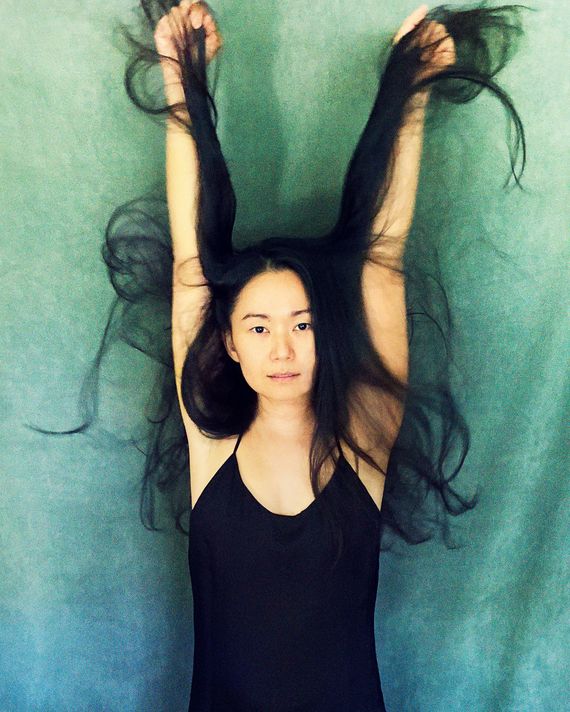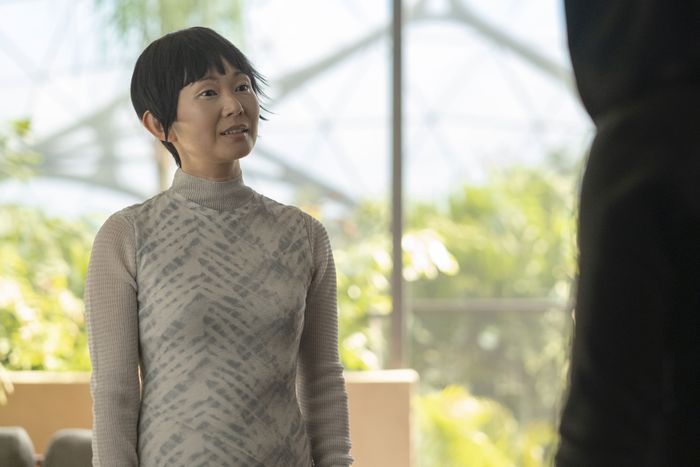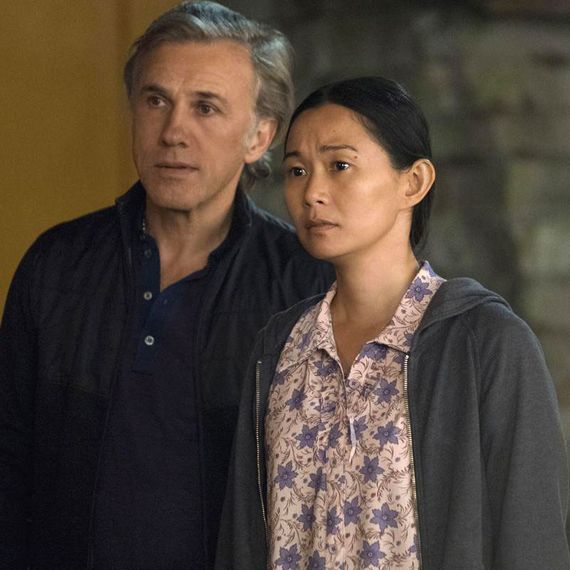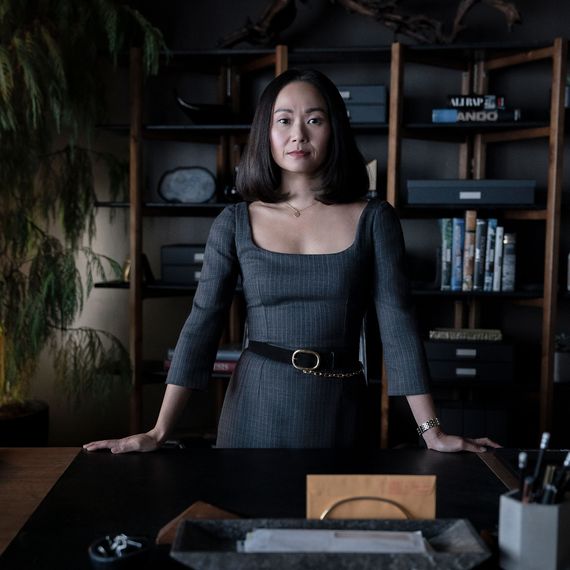
You’re not really supposed to notice Hong Chau in the first season of Homecoming until it’s too late. She plays Audrey Temple, a secretary at the unscrupulous Geist Group’s offices and assistant to professional dick-swinger Colin Belfast (played by expert bloviator Bobby Cannavale). Female secretaries often have a thankless role in both life and onscreen—an office drone who adds a touch of femininity to the surroundings, like a potted plant. Audrey first appears in the fourth episode to interface with the beginning of a crisis that eventually takes down Colin. In fact, she’s the one to orchestrate the takedown, and, in the finale, the person Colin took for granted is suddenly the one asking for his resignation. In the second season, she becomes the protagonist scaling the corporate ladder—the anti-hero of her own story.
Casting Chau was always a longer play for the show. Initially, the creators Eli Horowitz and Micah Bloomberg didn’t know what her role would look like in the second season—just that she would rise to a position of power. “We were lucky about the moment in her career that we got her because, for practical reasons, it was important that that character not be some megastar,” says Horowitz. “She’s supposed to be overlooked, not just by the characters but by the viewer. Two years ago, she was still someone who, if you paid attention, you were keeping your eye on, but she was also able to disappear into a role. Her arc over the two seasons of Homecoming has paralleled her rise as a performer.”
By Chau’s own estimation, her career has been “slow and incremental.” Even in minor parts, she has a talent for giving her characters a life force that extends beyond the script. She’s a favorite of auteur directors and takes roles in part to work with the ones she likes, like Miguel Arteta in Duck Butter and Paul Thomas Anderson in her first feature, Inherent Vice. She charmed in a stand-alone episode of Alan Yang and Matt Hubbard’s Forever and made a whirlwind entrance as the trillionaire super-genius Lady Trieu in Damon Lindelof’s Watchmen. You can sense the rest of the iceberg underneath all of those parts.
She carries that gravity this spring in leading roles in the second season of Homecoming and the recently released film Driveways, for which she received a surprise Film Independent Spirit Award nomination for Best Actress. “You get the sense she has a secret from you,” says Andrew Ahn, the director of Driveways. “That secret feels like the character’s humanity.” “You can never tell what she’s thinking,” adds Lindelof. “But you know she is thinking constantly.”
That sense of mystery is present talking to Chau herself. We recently spoke on the phone for about an hour, during which she answered questions slowly and carefully. Anything more would need to happen over email. When I sent a handful of follow-up questions, she responded with a nine-page, single-spaced Word document. What appeared to be a disinterest in sharing private thoughts was more an exercise in keeping distance from journalists.
If Chau is wary of the media, that’s partly due to the fallout from her six-month press tour for Alexander Payne’s 2017 science-fiction film, Downsizing. She learned all she could control was the work, not people’s perceptions of it. “Because I’m not interested in playing characters with unimpeachable qualities,” she says, “I have to surrender to being mischaracterized.”
In Downsizing, a.k.a. the tiny Matt Damon movie, the stars seemed to have aligned: Chau, now 40, had been working in the business for well over a decade, and here was a dream role in an Oscar vehicle. (Before Payne cast her, he emailed Anderson to ask what she was like to work with; he responded immediately saying, “Hong Chau is a star.”) After wrapping production, her management sent her out on a series of meetings with studio executives and directors pitching her as “the female romantic lead opposite Matt Damon in an Alexander Payne movie.” It was a bit of Hollywood sleight of hand. “People were super-eager to meet me, and I think they were expecting an Asian Margot Robbie,” Chau says, laughing. “That is not who I am. It was just feeling people were underwhelmed and disappointed. I told my manager, ‘You’ve got to stop pitching me as that!’ ”
Her character in Downsizing, Ngoc Lan Tran, is an onscreen rarity: a Vietnamese refugee and political dissident who is shrunken to a height of five inches as corporal punishment. More so, she’s an amputee speaking with an accent that audiences rarely hear—the kind of English acquired through survival. Chau is undeniably good as Ngoc Lan, filling her no-nonsense attitude with warmth and softening her sharp pragmatism with a soul-stirring weariness. It’s still Chau’s favorite part, and years after shooting, she thinks of Ngoc Lan like an old friend.
When the movie screened at Telluride at the start of the Oscar season, an Asian-American critic wrote a scathing pan, singling out Chau’s character in particular as “dragon-lady prime,” a “hilarious gook,” and “minstrel shit.” The review lingered like a fart in an elevator. Over the next six months, mostly white (and extremely online) reporters felt obligated to ask about “the accent.” The character now had to answer for deeper issues around representation and stereotypes. Every interview with Chau parroted these questions, creating an atonal echo chamber that distorted any meaningful conversation around the film.
Chau experienced a profound dissonance between the character she had created and this reaction. Ngoc Lan was a woman whose journey mirrored her parents’; her amputated leg made her think of the many wounded who survived the Vietnam War. In a study of contrasts, the weekend prior to Downsizing’s release, another Vietnamese-American woman, Kelly Marie Tran, became the first Asian in space as Rose Tico in Star Wars: The Last Jedi. Whereas Rose offered an escapist fantasy of inclusion in one of the biggest movie franchises in history, Ngoc Lan, Chau felt, was left twisting in the wind. “I can laugh about it now, how differently the characters were received. But at the time, people’s inability to embrace both really hurt,” says Chau. “Here comes my girl Ngoc Lan Tran hobbling in. At first glance, she seems like a breathtaking smorgasbord of everything you don’t want an Asian character to be. It was like watching the newer generation leave their embarrassing elders behind to go off with their new friends.”
While Chau received SAG and Golden Globe nominations, momentum around the movie flagged; it has the ignominious distinction as the first Payne movie not to receive any Oscar nominations. “The fact that the movie tanked didn’t help anyone connected with the film,” Payne tells me. “I remember speaking last year to Emma Stone, and one of the first things she said to me was, I wanted to tell you how horrified I was, not only that Hong Chau wasn’t nominated for an Oscar but that she didn’t win.”
Afterward, Chau flew to London to film a role in Artemis Fowl to get away from “tasteless interview requests” about her Oscar snub. She focused on projects that moved her. “I came to realize I don’t want to spend the majority of the year going to parties, shaking hands, selling myself,” she says. “If I can work on smaller things and not do all the other stuff, I’m willing to sacrifice the popularity that comes with higher-profile jobs.” Chau fielded offers to be in more mainstream projects, including a “big comic-book movie.” She turned it down. (A few days later, the role went to a white actress. “They move on quickly,” she remarks.) Over the following years, she passed on a supporting role in a film that went on to get a Best Picture nomination and on an offer to return to Big Little Lies for its second season. Instead, she chose lead roles in smaller films—as a protective mother in the tender Driveways and a radical activist based on Wendy Yoshimura in American Woman—that didn’t have the promise of wide release.
“Did I end up kicking myself?,” Chau continues, “when the two indies I chose weren’t looking like they were even going to land distribution? Yeah, a little bit. But the sting wasn’t because I wish I had been in those classy projects. I just wanted the scrappy ones to take off. It felt more exciting to take a risk on something than taking an easy role so I could be viewed in proximity to greatness but have no chance to be great myself.”



Chau is possessive of her characters and prefers to sit with them alone. “Directors, the good ones, don’t want to hold an actor’s hand,” she says. “They’re looking for an independent artist who can bring a lot to the table. The more hands off somebody can be with me, the better.” When she first gets a script, she reads it again and again until she has a feel for its rhythm. She has it on her body during the day and keeps it next to her when she goes to sleep. Every molecule of her imaginative energy goes to building an interior world—she envisions them in situations we may never see, saying things that might not be in the script. During filming, she releases them from that internal compression, like a diamond made manifest.
When a character needs development, “I try to get creative and solve things without asking for more lines,” Chau explains. On Watchmen, she advocated for specific choices around the look of Lady Trieu, whose master plan involves omnipotence. Chau naturally has bellybutton-length hair, perfect for the “earthy” Lady Trieu the creative team had pictured. But she imagined her character with a helmetlike cut and frosty makeup. “I wanted her to be a diva,” she says. They were taken aback, she recalls, but acquiesced with some minor adjustments. To complete the ensemble, Chau requested gloves. “I liked the idea that we never see her hands,” she says. When Lindelof asked why, she responded, “Just because.”
By the finale, a “loose character thread” was nagging at Chau. Lady Trieu notes early in the show that she built a sprawling vivarium for her mother. “I wanted that to mean something,” Chau says. “I wanted a symbol to bring everything back to her mother and country.” She decided she should wear a khan dóng, a Vietnamese headpiece, as a tribute to her mom. “Most people wouldn’t get it, but Vietnamese people would,” she adds. Chau argued for its significance in a three-page letter to Lindelof. The hat was in.
Still, maybe all her character needed was more screen time. In a postmortem, The Sympathizer novelist Viet Thanh Nguyen voiced a sentiment prevalent among Asian–Americans that the show hadn’t done Chau’s character justice. Whereas careful attention was paid to America’s history of Jim Crow racism, the same care wasn’t given to American imperialism in Vietnam. (There were, for instance, no Vietnamese-American or Asian-American writers in the room.) Nguyen argued that another episode could have given her character a necessary backstory for her motivations, and doing so could have tied together the legacies of the antiwar and civil-rights movements.
Chau hadn’t read the piece and dismissed the critique. “I don’t know if that’s valid criticism,” she says. “The backstory was told to me by Damon, so I was able to use that in my creation of the character. I felt serviced in that way.” She thinks about race on the level of personal detail that informs her process rather than as a question of power. “I don’t even like the term ‘people of color,’ ” Chau says at one point, correcting herself after using the descriptor during our phone call. “Because I think we’re just people.” It’s this defiant humanism that both makes her a powerful actress and inevitably puts her at odds with the sometimes glib boosterism of Asian–American representational politics. Humans are too complex to be slotted into categories, and she’s resistant to what she perceives as audience projections. That was the lesson she took from Downsizing. She writes:
“A repeated fear I heard was … even if I was being earnest in my performance, there were people who were going to laugh for the wrong reasons. Okay, but … that’s not my problem. That’s their problem. I grew up in Louisiana. I guarantee you racists don’t need a movie to remind them to be racist. Why do I have to be concerned about what the dumbest person in the audience thinks? Should my parents be afraid to go outside? Should they hide behind their children who speak the good English? Am I supposed to be afraid someone, somewhere might make fun of me? Christ Almighty … I often want to shake people and shout, Stop caring so much what white people think!”
This has been the fundamental bind of Chau’s life in public: How do you craft your characters with vivid interior lives and then engage in a conversation about their limitations? With roles like the ones in Driveways, Homecoming, and American Woman it may not be a question anymore—the characters are large enough to speak for themselves. Besides, Chau has moved past trying to explain herself. “I don’t task myself with changing minds or being understood anymore,” she says. She isn’t trying to score points online and thinks obsessing over media representation is a pretty bourgeois activity. “Now that we’re in 2020, in the middle of a pandemic, would that same critical audience be able to see the movie differently?” she asks, her mind still on Downsizing. “People like Ngoc Lan — people who mow your lawns, take care of your babies when you’re at work, take care of your elderly parents in nursing homes, scrub the dead skin off your feet, empty your trash, grow your food, package your food — they don’t become film critics. They don’t write think pieces about representation. They don’t spend hours on social media talking about how they don’t feel seen.”
At the end of my email, I not so casually suggest it might be easier if we spoke on the phone again. “Well, Alex,” she writes, “it seems we won’t need to speak again for at least ten years. We’ve covered it all.”
*A version of this article appears in the May 25, 2020, issue of New York Magazine. Subscribe Now!

